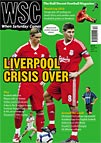 Gunther Simmermacher explains how the pressures of hosting a World Cup may be getting to South Africa
Gunther Simmermacher explains how the pressures of hosting a World Cup may be getting to South Africa
Even by the standards of South African football, the appointment of Brazilian coach Joel Santana to lead the national team, Bafana Bafana, at the 2010 World Cup was an eccentric decision. In April 2008 Carlos Alberto Parreira, the 1994 World Cup-winning coach, quit as South Africa coach to be with his ailing wife. South African Football Association (SAFA) president Molefi Oliphant asked him to recommend a successor. Parreira suggested Santana, then at Flamengo.
According to some SAFA executives, Oliphant took the decision to appoint Santana unilaterally, presenting the coach’s contract as a fait accompli to the SAFA executive, allegedly having ignored a 13-name shortlist drawn up by the departing coach, headed by Luiz Felipe Scolari (Oliphant insists that Parreira gave him only Santana’s name). Parreira seemed to congratulate SAFA on their excellent choice, promising that Santana was the right man for the job. Parreira was mistaken.
Bafana fans and SAFA tend to expect results above their very ordinary team’s capacity; unreasonably high demands have seen the dismissal of 12 full-time coaches in 17 years. Parreira himself had failed to take an experimental, young Bafana side out of the group stages at the 2008 African Cup of Nations (ACN).
The dour Santana even contrived to preside over South Africa’s failure to qualify for the 2010 ACN after picking up only one point in four games against Nigeria and minnows Sierra Leone. This was described as “a blessing in disguise” by SAFA CEO Raymond Hack because not competing at the continental showpiece would supposedly aid the team’s World Cup preparations.
Yet Santana’s record turned out to be better than that of most of his many predecessors. Between Bafana’s qualification failure in October 2008 and this year’s Confederation Cup in June, the team won seven times – including against Ghana, Cameroon, Norway and Poland – and lost only twice. This was followed by unlucky defeats to Brazil and Spain (after extra time) in the Confederations Cup.
Santana, it is safe to say, was not popular. His defensive tactics did not appeal to South African fans or the press, nor did his reputation as an arrogant man who refused to consult with local coaches – an image which is at odds with reports from Brazil, where his players at Flamengo regarded him warmly as a “father figure”. The pressure began to mount after a string of defeats against European opponents. This included a loss to a second-string Ireland side on September 8 that saw South Africa slide to an all-time low 85th place in the FIFA rankings.
When Oliphant departed as SAFA president in September, his successor, Kirsten Nematandani, hinted strongly that he wanted Santana gone. Spineless defeats in Norway and Iceland, and Santana’s ill-advised, defiant statement to the effect that he was not employed to win friendlies, provided Nematandani with grounds to force the coach’s resignation. In what must have been a humiliating meeting, Santana was compelled to concede that he had lost the ability to motivate his team.
Parreira’s return had been rumoured even before Santana’s ultimately gracious departure, giving rise to speculation that the latter had just kept the seat warm, at a generous salary in the region of £120,000 a month, for his friend Carlos. But Parreira’s return was not inevitable. Before Santana, other foreign coaches – including Carlos Queiroz, Philippe Troussier and Stuart Baxter – had been unsuccessful, giving rise to a notion that foreign coaches don’t understand the local football culture.
Indeed, South Africa’s sole trophy, the ACN in 1996, was won under a local coach, Clive Barker. SAFA were divided over whether to bring in a foreigner, but the pro-Parreira faction persuaded the association’s executive that the Brazilian’s experience would be an asset at the World Cup. Nematandani has promised that a local coach will be appointed when Parreira’s contract expires after the World Cup. Parreira can’t really lose with South Africa. If he leads Bafana out of Group A next June, he’ll be celebrated as a national hero; should he fail, the nation will blame the hapless Santana.
From WSC 274 December 2009